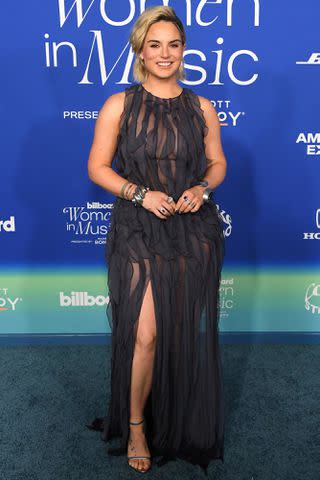JoJo Never Thought She Would Struggle with Addiction Like Her Parents. Then It Took Hold: 'Super Self-Righteous' (Exclusive)
Joanna "JoJo" Levesque tells PEOPLE exclusively about how growing up with two parents who struggled with addiction impacted her life

Rodin Eckenroth/Getty
Joanna "JoJo" Levesque in October 2019Joanna "JoJo" Levesque's memoir, Over the Influence, is out now
In the book, she writes about growing up with parents who experienced addiction and how she ultimately also struggled with alcohol and substance use
JoJo opens up to PEOPLE about realizing she was going through addictive patterns in her own life
Joanna "JoJo" Levesque learned firsthand that no one is exempt from falling into addiction.
In her new memoir Over the Influence, out now, the musician and author, 33, recalls spending much of her young childhood in church basements while her parents, mom Diana and late father Joel, attended Alcoholics Anonymous meetings. Witnessing their struggles, she thought, would prevent her from experiencing similar patterns — but she later abused alcohol and substances as a young adult.
"For a while, I was super self-righteous and thought I'd never be like my parents. I was like, 'No, because I'm the strongest. I'm wicked strong,'" JoJo tells PEOPLE exclusively. "But then I was like, 'Oh, what I'm doing is no better or worse. I'm my parents' child, and I need to be awake to what's happening within myself.'"

Amazon
Joanna "JoJo" Levesque's 'Over the Influence' book coverJoJo's parents' relationship began in AA meetings; Diana was an alcoholic, and Joel used substances, including pills. They divorced when she was 5 years old, and she moved in with her mom, who soon obliged her daughter's begging and started bringing her to local auditions for TV programs showcasing talented kids.
Over the next few years, JoJo showed off her young powerhouse vocals on Destination Stardom, The Rosie O'Donnell Show and America's Most Talented Kids, among others. Her mom quickly grew skeptical of the entertainment industry, but JoJo was insistent on becoming a star — and convinced herself she'd be able to save them from poverty.
"I think I really somehow felt the sense that things weren't going to be okay, and things weren't okay," says JoJo, who moved around with her mom quite a bit and often stayed with friends or family. "I was just like, 'That's fine because I am going to be famous.'"

Courtesy of the Author
Joanna "JoJo" Levesque and her mom, DianaAfter turning down multiple offers, Diana allowed JoJo to sign with Blackground Records at age 12 — but required she manage her own daughter. About a year later, JoJo earned a chart-topping single with 2004's "Leave (Get Out)," became a celebrity and started touring the world. "I was like, 'Oh, well, it's taken my whole life, so it's about time,'" she recalls.
The new lifestyle, however, proved difficult for her mother. "She was a single mom, she was a singer, she did what she needed to do to make money by cleaning houses, and then she became the manager of this young phenom," says JoJo. "That's so weird and scary."
As her daughter's fame level continued to rise, Diana started hearing murmurs about shady business in the music industry and grew paranoid. She started drinking again, experienced mental health struggles and ultimately contemplated suicide, with a teenage JoJo helping to talk her out of it. "I'm just so grateful that she's here," she says.

Amy Sussman/Getty
Joanna "JoJo" LevesqueIncluding such dark moments in Over the Influence wasn't easy for either of them. Before starting the book, JoJo told Diana she'd be writing about "some of the hardest moments in my life" and promised to paint her as "a full human being" within its pages. Once her mother read a polished draft, JoJo says, "She was proud of me, and that meant a lot to me."
The mother-daughter duo remains close to this day. They lived together throughout the COVID pandemic, JoJo featured her on the song "Proud" from her 2020 album, Good to Know, and Diana attended her daughter's opening night as Satine in Moulin Rouge! The Musical on Broadway last year.
"I admire her for many things — her sobriety, her commitment to health and her ability to take accountability. I love that about her so much," says JoJo. "She's such a beautiful person."

Courtesy of the Author
Joel Levesque and Joanna "JoJo" LevesqueJoJo's father had an on-again, off-again presence in her life. She loved spending time with him as a child and connecting over music, but his addiction got worse throughout her teenage and young adult years, as did his health, so she didn't see him as much. When she did, he was clearly struggling and often didn't have stable housing.
She says she repeatedly tried to help him and even set him up with a place to live and access to professionals who'd help him get back on his feet, but he wasn't able to commit. "I think my dad was trapped in his body. He had so many struggles in his mind," she says of Joel, who died in November 2015. "In his passing, I had to learn that some people, as much as we want them around, sometimes that's the completion of their journey."
Through years of therapy, she realized, "I could not be responsible for the life or happiness of either of my parents — because I did feel responsible for a long time."

Steve Granitz/FilmMagic
Joanna "JoJo" LevesqueSince Joel's death, and especially as she began performing on Broadway, JoJo's continuously thought about what it'd be like to have her father around today. "Sometimes I'll walk around my apartment and be like, 'F--- you, man,' with a smile, 'You know you're supposed to be here. You know you're supposed to be in that audience,'" she says. "He would love it, and he always did love it."
As for JoJo, her first experience with alcohol was a drunken teenage night on tour, but she was later caught by Diana and stayed away from drinking for years. As she neared adulthood, Blackground lost its distribution deal and could no longer properly release music, but the label still had the rights to her commercial recordings under her contract.
Frustrated with various elements of her life, she started drinking more regularly and using drugs like Adderall and Xanax in both personal and professional settings. On multiple occasions, she even drove a car while blackout drunk.

Getting out of record label limbo in 2014, plus subsequently going to therapy and focusing on her physical health, helped JoJo find a healthier relationship with alcohol and substances.
Still, she felt unresolved. Toward the end of her book-writing process in 2023, she came to terms with various repeated patterns of addiction in her life and decided to attend an AA meeting with a friend.
"You can feel less alone at an AA meeting when people are sharing, and AA does stand for Alcoholics Anonymous, but people go for a multitude of things. People who are love addicts or sex addicts or food addicts, or whatever, they're going to get what they need," says JoJo, who adds she is not sober today. "I was just feeling like I needed a sense of community and home. I felt far away from myself, and that has been a touchstone for me since I was young."
Opening up about her own struggles in Over the Influence wasn't easy for JoJo, but if she's able to help any readers process their own trauma, it's worth it. "I just hope that people are encouraged to release any shame that they felt about different things in their life," she says, "and to live unapologetically and freely and clear-eyed, no longer under the influence of things that really aren't true to them."
If you or someone you know is struggling with substance abuse, please contact the SAMHSA helpline at 1-800-662-HELP.
For more People news, make sure to sign up for our newsletter!
Read the original article on People.

 Yahoo Lifestyle
Yahoo Lifestyle 
